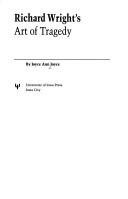| Listing 1 - 2 of 2 |
Sort by
|

ISBN: 1587291215 9781587291210 0877451486 9780877451488 0877453209 9780877453208 0877453209 Year: 1991 Publisher: Iowa City : University of Iowa Press,
Abstract | Keywords | Export | Availability | Bookmark
 Loading...
Loading...Choose an application
- Reference Manager
- EndNote
- RefWorks (Direct export to RefWorks)
In this first full-length study of Native Son, Joyce Ann Joyce provides a stylistic and thematic reading of one of the most important works of Black American literature, demonstrating how Wright's exquisite use of language merges with his subject to create an American tragedy. Because many scholars have approached the novel from naturalistic and existential perspectives, Joyce devotes her first chapter to a discussion of the novel's critical history. She compares previous criticism to her own perspective of the novel as tragedy, describing the features shared by each as well as their points of
Book
ISBN: 1501757504 1609092007 9781609092009 9781609092009 9780875807393 0875807399 Year: 2016 Publisher: DeKalb, Illinois : NIU Press,
Abstract | Keywords | Export | Availability | Bookmark
 Loading...
Loading...Choose an application
- Reference Manager
- EndNote
- RefWorks (Direct export to RefWorks)
"In 2015, Chicago became the first city in the United States to create a reparations fund for victims of police torture, after investigations revealed that former Chicago police commander Jon Burge tortured numerous suspects in the 1970s, '80s, and '90s. But claims of police torture have even deeper roots in Chicago. In the late 19th century, suspects maintained that Chicago police officers put them in sweatboxes or held them incommunicado until they confessed to crimes they had not committed. In the first decades of the 20th century, suspects and witnesses stated that they admitted guilt only because Chicago officers beat them, threatened them, and subjected them to "sweatbox methods." Those claims continued into the 1960s. In Robert Nixon and Police Torture in Chicago, 1871-1971, Elizabeth Dale uncovers the lost history of police torture in Chicago between the Chicago Fire and 1971, tracing the types of torture claims made in cases across that period. To show why the criminal justice system failed to adequately deal with many of those allegations of police torture, Dale examines one case in particular, the 1938 trial of Robert Nixon for murder. Nixon's case is famous for being the basis for the novel Native Son, by Richard Wright. Dale considers the part of Nixon's account that Wright left out of his story: Nixon's claims that he confessed after being strung up by his wrists and beaten and the legal system's treatment of those claims. This original study will appeal to scholars and students interested in the history of criminal justice, and general readers interested in Midwest history, criminal cases, and the topic of police torture"--
| Listing 1 - 2 of 2 |
Sort by
|

 Search
Search Feedback
Feedback About UniCat
About UniCat  Help
Help News
News